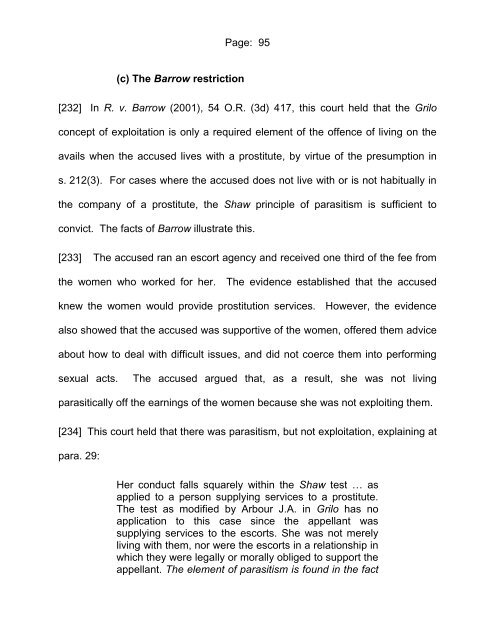Canada (Attorney General) v. Bedford, 2012 ONCA ... - York University
Canada (Attorney General) v. Bedford, 2012 ONCA ... - York University
Canada (Attorney General) v. Bedford, 2012 ONCA ... - York University
Create successful ePaper yourself
Turn your PDF publications into a flip-book with our unique Google optimized e-Paper software.
Page: 95(c) The Barrow restriction[232] In R. v. Barrow (2001), 54 O.R. (3d) 417, this court held that the Griloconcept of exploitation is only a required element of the offence of living on theavails when the accused lives with a prostitute, by virtue of the presumption ins. 212(3). For cases where the accused does not live with or is not habitually inthe company of a prostitute, the Shaw principle of parasitism is sufficient toconvict. The facts of Barrow illustrate this.[233] The accused ran an escort agency and received one third of the fee fromthe women who worked for her. The evidence established that the accusedknew the women would provide prostitution services. However, the evidencealso showed that the accused was supportive of the women, offered them adviceabout how to deal with difficult issues, and did not coerce them into performingsexual acts.The accused argued that, as a result, she was not livingparasitically off the earnings of the women because she was not exploiting them.[234] This court held that there was parasitism, but not exploitation, explaining atpara. 29:Her conduct falls squarely within the Shaw test … asapplied to a person supplying services to a prostitute.The test as modified by Arbour J.A. in Grilo has noapplication to this case since the appellant wassupplying services to the escorts. She was not merelyliving with them, nor were the escorts in a relationship inwhich they were legally or morally obliged to support theappellant. The element of parasitism is found in the fact
















